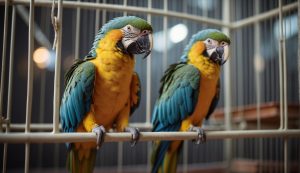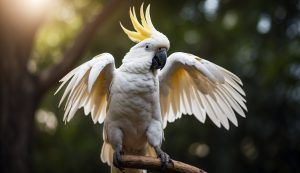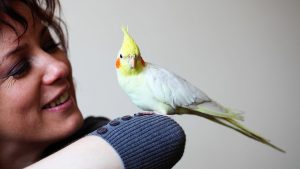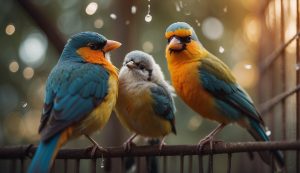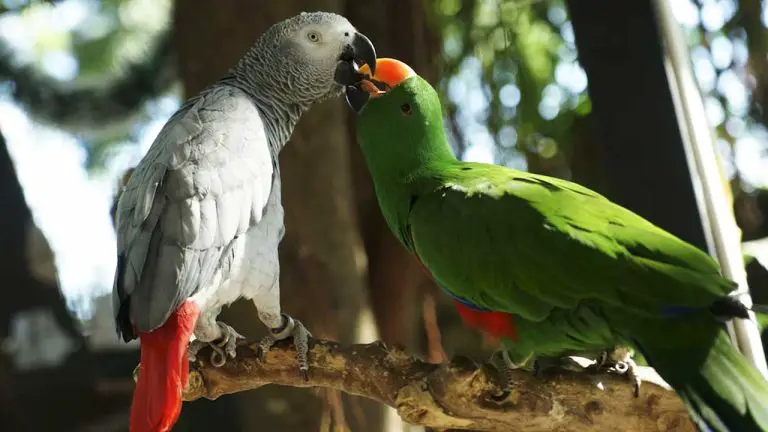Why Does My Bird Make Noises When Sleeping? Understanding Avian Nighttime Chatter

When my feathered friend is tucked in for the night, I sometimes hear them make noises during their sleep. It’s natural to wonder why birds vocalize even when they’re ostensibly resting.
Birds exhibit particular behaviors and postures during inactive periods, and noises could be related to these sleep behaviors. What might seem like an odd quirk to us could carry specific physiological or communicative purposes.
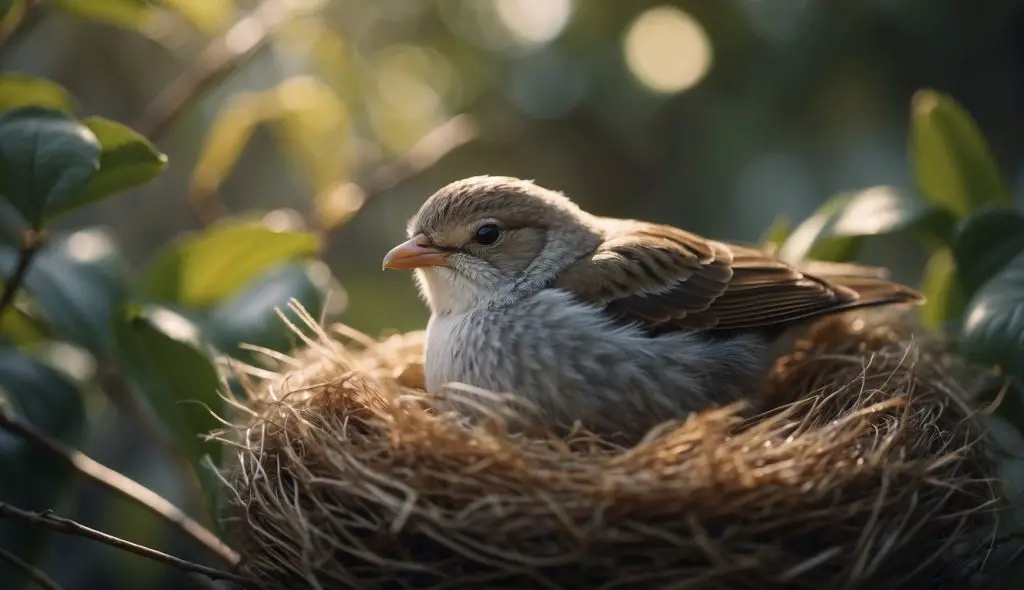
Not all sounds are directly related to the bird’s sleep quality or environment. Some noises may serve as social signals or responses to disturbances, such as those caused by anthropogenic noise.
Additionally, birds’ sleep behaviors and their nocturnal vocalizations can be influenced by their need to maintain certain biological processes even while asleep.
These biological necessities can include memory consolidation, which is especially important for birds learning songs or calls.
Understanding these elements helps to optimize our domestic birds’ environments and can clear up some misconceptions we might have about our birds’ nocturnal activities.
Key Takeaways
- Birds might vocalize during sleep due to behavioral or physiological processes.
- Nocturnal noises can indicate social communication or a response to environmental factors.
- Optimizing a bird’s sleeping environment can help minimize disturbances to their restful state.
Understanding Bird Sleep Behaviors
In my exploration of bird sleep behaviors, I’ll touch upon how noises play a role, the meanings behind these sounds, the impact of the environment, health implications, and the variety across species.
The Role of Noise in Bird Sleep
Birds can make noise during sleep as part of their normal rest cycle, which includes phases of REM sleep and unihemispheric slow-wave sleep. The latter allows them to rest one hemisphere of the brain while keeping the other alert.
These vocalizations can include chirping or whimpering and serve various functions, from communication to expressions of distress or contentment.
Common Noises and Their Meanings
The noises birds make during sleep—such as beak grinding, soft chirping, or even talking—are typically signs of relaxation and well-being. However, noises like squeaking or distress calls might indicate discomfort or the need to communicate with other birds, even during rest.
Influence of Environmental Factors
Environmental factors like lights, temperature changes, and habitat destruction can disrupt a bird’s sleep.
Artificial light and light pollution affect their circadian rhythms, while urbanization introduces noise that can impact their rest. Adapting to these elements, some birds change their sleeping patterns or locations.
Bird Health and Nocturnal Vocalizations
When birds exhibit unusual noises such as heavy breathing or sudden distress calls while sleeping, it may signal illness. If my bird was repeatedly shaking its head side to side or making noise while resting, I would consult an avian vet to rule out issues like a foreign body or sickness.
Sleep Behavior Across Different Species
Sleep behaviors and vocalizations during sleep vary significantly among species. Owls, being mostly nocturnal, remain quiet, while birds like budgies and parrots may vocalize more.
Migratory birds like the common nighthawk may have different sleep adaptations, and diurnal birds, such as cockatoos and finches, typically show quieter sleep behaviors.
Bird Social Interactions and Noises at Night
In my observations of birds, I’ve noted that they not only communicate and interact during the day but also at night through various sounds, which can sometimes include noises made while sleeping.
Mating and Social Communication
Birds use a variety of calls and songs at night as part of their mating rituals. I’ve heard complex mating calls and courtship displays that serve to attract a mate and communicate readiness for breeding.
The structure and posture that birds exhibit during these displays are carefully crafted to catch the attention of a potential mate.
Territorial Calls and Predatory Alerts
Territory defense is a serious business for birds, and even when perched at night, they make noises to assert their dominance over a territory.
Nocturnal bird behavior is also characterized by certain alarm calls, intended to alert others in their social hierarchies of the presence of predators, which often captures my full attention.
Adapting to Life in Human Environments
I’ve noticed that birds have had to adjust their behaviors due to urbanization and human activities. Nocturnal singing might be a response to daytime noise or light pollution, serving as a communication strategy to overcome the disturbance and maintain their ecological balance and reproductive success.
Bird Community and Hierarchy Interactions
The social structure within bird communities is complex. When I listen at night, I sometimes hear soft sounds or whimpering from birds that might be communicating with others or signaling their status within their social hierarchies.
Natural behavior can be altered by changes in the environment, like climate change, which affects nocturnal patterns and interactions.
Optimizing Domestic Bird Environments
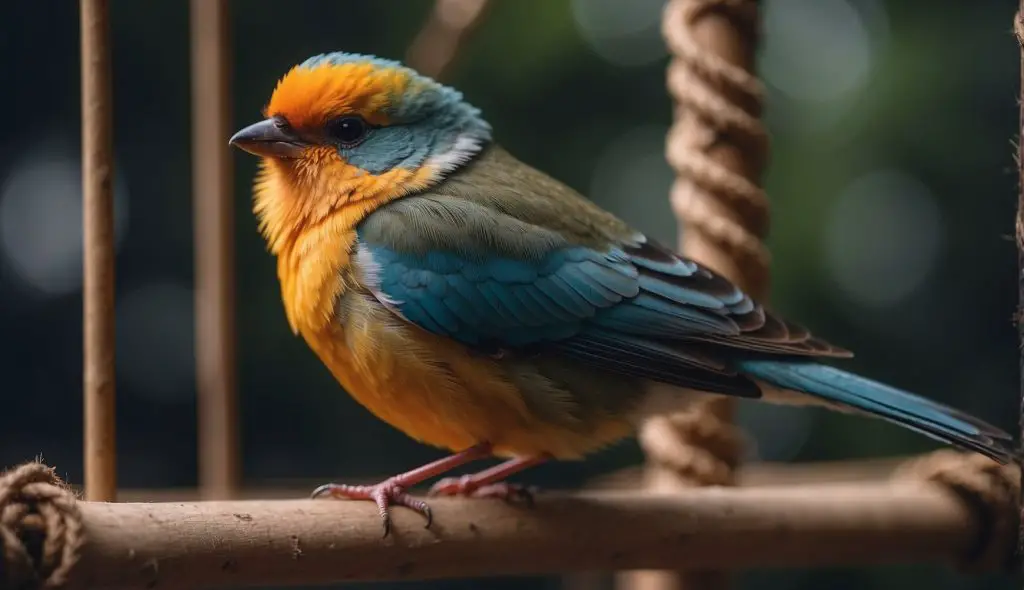
Creating a peaceful and healthy environment for pet birds ensures they remain content and reduces the likelihood of sleep-related noises. I’ve learned that attention to detail in their nighttime settings can make all the difference.
Mitigating Noise at Night for Pet Birds
Important points:
- Quietness: Ensure the room is as quiet as possible at night to prevent disturbances.
- Consistency: Keep noise levels consistent; sudden changes can startle birds.
Steps to reduce noise:
- Use thick curtains to muffle outdoor sounds.
- Place the cage in a quieter part of the home.
- Consider white noise machines to drown out intermittent noises.
How to Recognize and Respond to Bird Noises
Vocalizations vary: Birds make different sounds, from soft chirps while dreaming to distressed calls.
What to do:
- Listening: Learn to distinguish between normal sleep noises and cries for help.
- Observation: Watch for signs of distress during the day that may affect night behavior.
Enhancing Bird Well-Being and Sleep Quality
Environment: The right habitat encourages good sleep. I ensure my bird’s habitat has:
- Temperature: A comfortable range, generally between 65-75°F (18-24°C).
- Hygiene: Regular cage cleaning to prevent illness and discomfort.
Diet and Health:
- Balanced diet: A mixture of seeds, fruits, and vegetables supports overall health.
- Regular check-ups: Visits to an avian vet help catch any issues early.
Light:
- Natural light cycle: Replicating natural sunrise and sunset times aids their circadian rhythm.
- Avoid light pollution: Keep cages away from artificial lights that can disrupt sleep patterns.
Misconceptions and Frequently Asked Questions

I’ve found through experience that bird owners often confuse normal sleeping noises with signs of distress. In this section, I’ll clear up some common misconceptions and answer frequent questions to help you understand your feathered friend’s nighttime chatter.
Distinguishing Between Normal and Concerning Noises
When your bird makes noises while sleeping, it’s critical to distinguish between normal and concerning sounds.
Normal vocalizations might include soft chirps or twitters, which are often signs of contentment or simply a part of their dreaming process.
However, if you hear unusual squawking, heavy breathing, or sounds of struggle, it could indicate distress or health issues requiring attention from an avian vet.
- Normal sleeping noises: Soft chirps, gentle twitters
- Potential signs of concern: Unusual squawking, heavy breathing
Addressing Common Queries from Bird Owners
As a bird owner, you might wonder about various behaviors.
For example, why does my budgie chirp when I talk? It’s their way of communicating or seeking attention.
If you notice your budgie pulling another’s tail, it could be playful behavior or a sign of dominance. When a conure is biting another bird’s feet, it may be trying to initiate play or manifesting territoriality.
If you’re worried, it’s always best to consult with an avian veterinarian for advice on bird behavior.
- Communication: Budgies often respond to your voice by chirping.
- Social interactions: Tail-pulling can be playful or a dominance display.
Exploring Quirks in Bird Vocalizations
Birds have quirky vocalization habits that can be endearing or sometimes puzzling.
A new budgie might be sleeping a lot as they adjust to their environment, while a new parrot may be very quiet as it acclimates. These behaviors usually normalize with time.
Remember, every bird is an individual, and what’s quirky for one may be routine for another. It’s my personal joy to discover and understand these vocal quirks as part of the bonding process.
- Adjustment period: New birds often exhibit quietness or increased sleep.
- Individual quirks: Each bird has its own unique set of vocal behaviors.
Frequently Asked Questions
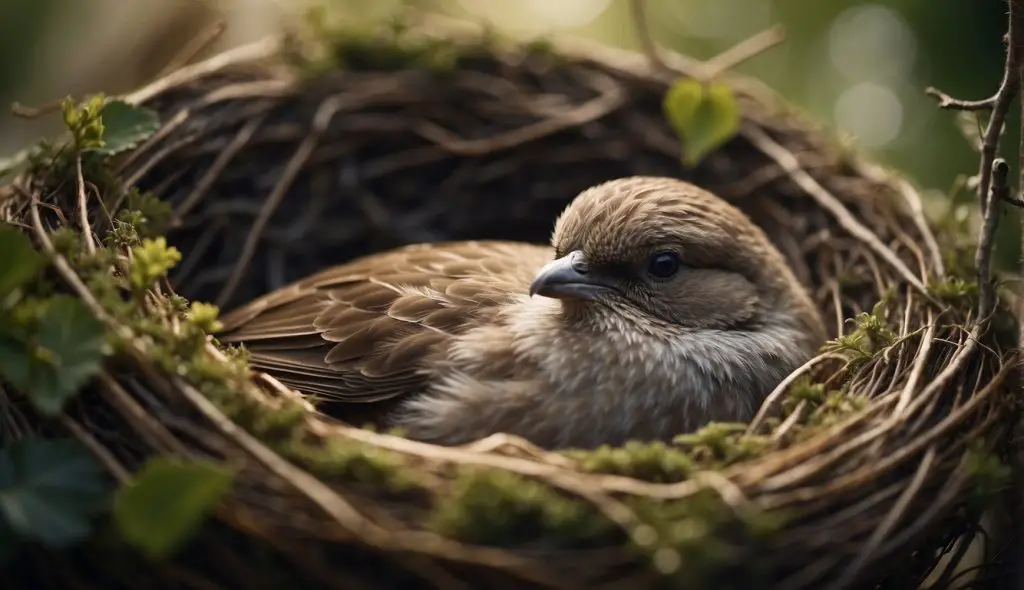
In this section, I’ll address common concerns about birds making noises during their sleep, including what various sounds might indicate and when to consult a vet.
Is it normal for my bird to chirp in its sleep?
Yes, it’s perfectly normal for birds to chirp in their sleep. This behavior is often a sign that they are in a deep sleep phase. This phase is similar to human REM sleep.
What does it mean if my parrot is making crying noises at night?
If your parrot is making crying noises at night, it may be experiencing a night fright. It could also be reacting to disturbances in its environment. Consistent crying noises might warrant a check to ensure that your parrot feels safe and comfortable.
Why is my budgie whimpering or making noises during the night?
Budgies and other birds might whimper or make noises at night due to dreams or slight disturbances. If this happens frequently, check their sleeping environment for any disruptions or potential stress factors.
Should I be concerned about weird noises coming from my bird at night?
Occasional weird noises might just be part of your bird’s sleep cycle. However, if you notice a sudden increase or an intensity in the noises, it might be a good idea to consult with a vet to rule out any medical issues.
What could be causing my bird to make clicking sounds while asleep?
Clicking sounds from a bird during sleep are generally not a cause for concern. It could simply be a way for them to clear their throat or respiratory system. However, persistent clicking could indicate a respiratory issue, so monitor it. If it continues, a vet check might be necessary.
Could talking in sleep be a sign of distress in birds?
Talking or vocalizing in sleep isn’t typically a sign of distress in birds. Birds often repeat sounds or talk in their sleep as part of their learning process or due to active dreaming.
If there are signs of distress along with talking, such as flapping or thrashing, then it may be worth investigating further.


